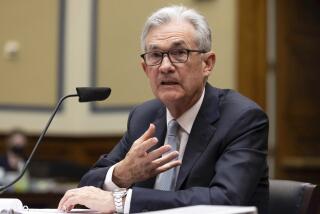U.S. Revises Rosy Forecast, Now Sees Slower Economy : Predicts Big Drop in Inflation
- Share via
WASHINGTON — The Administration revised downward today the rosy fiscal forecast by then-President Ronald Reagan, saying the 1989 economy will grow 2.7% rather than the 3.5% projected six months ago.
Administration officials also predicted that inflation will decline substantially in the second half of this year.
But an uproar developed on Capitol Hill over an Administration plan to save $2.9 billion in fiscal 1990, opening Oct. 1, simply by shifting a military payday from Oct. 1 to Sept. 29, the next-to-last day of fiscal 1989.
Congressional budget writers complained that the Pentagon’s shift was encouraging House and Senate committees to claim deficit reduction by bumping paydays of other agencies from 1990 into 1989.
Warning Issued
“This is the surest way to undermine our ability to achieve the targets” of the budget, House Budget Committee Chairman Leon E. Panetta (D-Carmel Valley) told White House Budget Director Richard G. Darman at a hearing.
At an earlier press briefing, Administration officials revealed that they have lowered their expectations for economic performance.
Darman said the Administration believes the gross national product--the measure of the nation’s economic output--”is assumed to increase by 2.7%” in 1989, compared with former President Reagan’s projection of 3.5% growth earlier this year.
Darman said the revised projection for 1990 economic growth is 2.6%--down from Reagan’s projected growth rate of 3.4%.
President Bush presented a budget plan to Congress Feb. 9 using economic assumptions made by the Reagan Administration before it left office Jan. 20 but which the Bush team did not have time to adjust. The midyear projections are the first set by the Bush Administration.
Mixed Reviews
The Administration’s new figures got mixed reviews on Capitol Hill, where Chairman Jim Sasser (D-Tenn.) of the Senate Budget Committee, said the prediction is better than the one Reagan used but is still too sunny.
“I think (the economic numbers are) still overly optimistic but not as grossly overly optimistic as they’ve been in times past,” he said.
But Sen. Pete V. Domenici of New Mexico, the budget panel’s ranking Republican, called the Bush assumptions “solid and reasonable and very close to the general consensus of economists.”
The Administration also revised downward its projection for the 1989 deficit to $148.3 billion from $164.1 billion predicted in February, mainly because of revenues running $13.2 billion higher than anticipated.
And the Administration forecast that if Congress enacts all the savings included in the budget lawmakers passed in May, the 1990 deficit will be $99.2 billion. That’s even lower than the $99.4 billion deficit forecast earlier this year.
In a press conference to release the Bush Administration’s revised economic and budget forecasts, Michael Boskin, chief White House economist, said the food and energy price increases of earlier this year will not recur.
“The inflation rate will be much lower in the second half of the year than in the first,” Boskin said.
More to Read
Get the L.A. Times Politics newsletter
Deeply reported insights into legislation, politics and policy from Sacramento, Washington and beyond. In your inbox twice per week.
You may occasionally receive promotional content from the Los Angeles Times.










